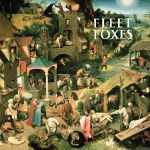|
|
 |
Dusted Reviews
Artist: Fleet Foxes Album: Fleet Foxes Label: Sub Pop Review date: Jun. 2, 2008 |

|
|
|
 |
Fleet Foxes begin and end their self-titled album with unaccompanied singing, beginning with a few close harmony lines on “Sun It Rises” and ending with Robin Pecknold’s soloing the final lines of “Oliver James.” Three and four-part harmonies are used throughout Fleet Foxes, and the band’s decision to emphasize vocals in this way − not just occasional block harmonies, but literally the first and last thing on the album and the foundation of each song − is the most distinctive single thing about it.
By design, I suspect, those harmonies are not especially complicated, and work in much the same way that the lead vocals work in any other piece of pop music; there comes a point on nearly every song where Pecknold or another band member sings solo, and the transition is pretty seamless. The music is then fleshed out with an assortment of instruments: acoustic and electric guitars, drums, mandolin, piano, and flute (among others), with individual songs divided into multiple sections built around different instrumental melodies. “Heard Them Stirring” is more or less an instrumental song, and on one track, “Ragged Wood,” Fleet Foxes apparently shoved two different songs together, with the song transitioning between two different up-tempo segments by means of a long mid-song acoustic guitar break.
The freewheeling song structures and instrumental line-up give critics a number of reference points for the music, from choral music, to folk, to film scores, although the baroque song structures make the most obvious comparison one to late-60s acts like Fairport Convention and Crosby, Stills, and Nash. Indeed, Pecknold lists those and other bands from that era as influences back when he and Skyler Skjelset formed Fleet Foxes. Most of the members of the band are also active in other bands in their hometown of Seattle − Casey Westcott and Christian Wargo (who replaced the original bassist, Craig Curran, who played on Fleet Foxes) are in Crystal Skulls, and Nicholas Peterson has played with Pedro the Lion. Pacific Northwest indie rock thus figures in more than a few of the arrangements, like the anthemic “Your Protector.” (The album was also produced by Phil Ek, who’s probably most famous for his work with Modest Mouse and Built to Spill.)
The lyrical topics are fairly uniform: Some songs are explicitly about natural themes (for instance, the title of “Meadowlark” tells you exactly what the song is about), while others at least touch on thems⎯like the abundant winter imagery of the first single, “White Winter Hymnal.” But most of the songs are less about nature itself than love of nature; “Blue Ridge Mountains,” which recounts a hiking trip through the mountains, is the best example. Late-60s west coast pop music being the style most closely associated in the public consciousness with an enthusiasm for the outdoors, the music suits the lyrics well, and vice versa.
Fleet Foxes is an impressive updating of those influences. At times, it sounds as though the band was still working through exactly how they wanted all of the various elements to work together, such that there are some immediate, hook-filled songs (“White Winter Hymnal,” “Your Protector,” “He Doesn’t Know Why”) and other songs whose more complex structures require more from the listener (“Tiger Mountain Peasant Song”). And while this evolutionary process may never fully stop, it’s producing some worthwhile work along the way.
By Tom Zimpleman
|







